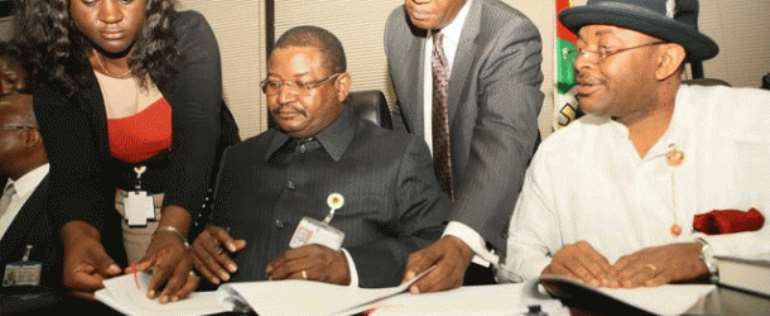PIB to check oil asset vandalism

Host communities of oil and gas resources and assets will, henceforth, be penalised for cases of vandalism if the current Petroleum Industry Bill before the National Assembly is eventually passed into law, the Nigerian National Petroleum Corporation has said.
The corporation said this will be implemented through the Petroleum Host Community Fund, which will be created by legislation and will coordinate conditional participation of host communities in the petroleum industry by enforcing security of infrastructure and consequences for vandalism.
According to NNPC's Group Executive Director, Exploration and Production, Mr. Abiye Membere, who addressed journalists in Lagos weekend, the PIB would incorporate lessons learnt from the Niger Delta on all new frontiers and increase freedom to operate by including host communities as stakeholders.
He said the PIB would assign oil and gas infrastructure security to the host communities and minimise environmental degradation due to vandalism and crude oil theft.
'There is the flexibility to make changes depending on the existing environment; and the PIB provides environment to consult host communities widely prior to making regulations for the management of the fund,' Membere said.
Also in a fresh move, the NNPC said it had initiated new ways of reducing the high cost of operation in the oil and gas sector.
According to Membere, the corporation is working towards achieving the standardisation of processes and evaluation mechanisms for estimation of drilling and drilling services costs, using a common template across all the International Oil Companies.
The NNPC, he said, had also moved to benchmark major costs of players in the sector.
The NNPC GED said another new agency would be created from the PIB, to be known as the National Frontier Exploration Services Department.
According to him, it will be vested with the responsibility of promoting front end data acquisition of hydrocarbons in the frontier basins in the hinterland.
When passed into law, he said the bill would deliver needed reforms within 36 months, which would be driven by a special task force on the PIB and an implementation committee.
Listing the objectives of the PIB, Membere said it would enhance exploration and exploitation of petroleum resources; significantly increase domestic gas supplies (especially for power and industry); create competitive business environment and establish fiscal framework that was flexible, stable and competitively attractive.
According to him, it will also create a commercially viable National Oil Company, create efficient regulatory institutions; engender transparency and accountability; promote 'Nigerian content' and promote and protect health, safety and environment concerns.
Membere said the draft PIB recommended a fiscal policy framework derived from a strategic national interest, with incentives for attracting sustainable investment to the region, as well as achieving the unbundling of the Nigerian National Petroleum Corporation.
'It recommends the creation of a National Oil Company that promotes indigenous operational capacity development, as well as the creation of an asset management company, and a gas market and gas infrastructure development company,' he said.
According to him, the PIB will strengthen regulatory and inspectorate institutions that promote transparency, safety, consumer rights and safe environments.
Membere added that a department in the Ministry of Petroleum Resources charged with frontier exploration services would be established courtesy of the PIB.
